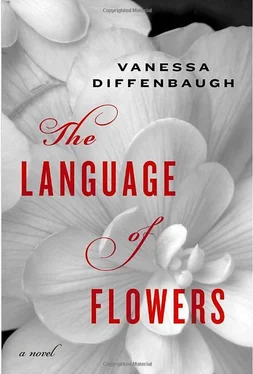Renata returned and began ordering me around the walk-in. There was another job, a small one, to be delivered down the hill. She retrieved a blue ceramic vase while I gathered the leftover yellow flowers.
“How much?” I asked, because price guided our arrangements.
“It doesn’t matter. But tell her she can’t keep the vase. I’ll stop by for it next week.” Renata slid a scrap of paper toward me as I finished the arrangement, an address scrawled in the center. “You take it,” she said.
On my way out the door, my arms around the heavy vase, I felt Renata slip something into my backpack. I turned. She had locked the door behind me and was heading toward her truck.
“I don’t need you again until next Saturday, four a.m.,” she said, waving goodbye. “Be prepared for a long day, no breaks.”
I nodded, watching her get in her truck and drive away. When she turned the corner, I set down the vase and opened my backpack. Inside was an envelope with four pressed hundred-dollar bills. A note read: Payment for your first two weeks. Don’t disappoint me . I folded the cash and put it in my bra.
The address led me to what looked like an office building, only two blocks down the hill from Bloom. The glass windows of the storefront were dark. I couldn’t tell whether there was a business inside, closed on Sundays, or whether there was no business at all. When I knocked, the doors rattled on metal hinges.
A window opened on the second floor, and a disembodied voice floated down. “I’ll be a minute. Don’t go anywhere.” I sat down on the curb, the flowers at my feet.
Ten minutes later, the door opened slowly, and the woman who opened it was not out of breath. She reached for the flowers.
“Victoria,” she said. “I’m Natalya.” She resembled Renata with her light milky skin and water-colored eyes, but her hair was acetaminophen-pink and dripping wet.
I handed her the flowers and turned to go.
“Change your mind?” she asked.
“Excuse me?”
Natalya stepped back as if to let me through the door. “About the room. I told Renata to tell you it’s literally a closet, but she seemed to think you wouldn’t mind.”
A room. The cash in my backpack. Renata had staged an intervention, and all without letting on that she understood. My instinct was to walk away from the open door, but the reality of having nowhere to walk to was insurmountable.
“How much?” I asked, stepping backward.
“Two hundred a month. You’ll see why.”
I looked up and down the street, unsure what to say. When I turned back, Natalya had already walked through the empty storefront and was climbing steep stairs.
“Come or don’t,” she called, “but either way, close the door.”
I took a deep breath, exhaling through floppy lips, and stepped inside.
The one-bedroom apartment above the empty storefront looked as if it was designed to be office space, with thin commercial carpet over cement floors and a kitchen with a long bar and short refrigerator. The window over the kitchen was open and framed a view of a flat roof.
“I can’t legally rent this room,” Natalya said, pointing to a half-door positioned on the wall near the living room couch. It looked as if it would open to a crawl space or a small water heater. Natalya handed me a key chain with six keys, all numbered. “Number one,” she said.
Kneeling, I opened the low door and crawled inside. The room was too dark to examine. “Stand up,” Natalya said. “There’s a string hanging down from the light.” I grasped around in the darkness until I felt the string on my face. I pulled.
A bare lightbulb illuminated an empty blue room, blue as a painter’s palette on a boat in the middle of the sea, bright as illuminated water. The carpet was white fur and almost looked alive. There were no windows. The room was big enough to lie down in but not big enough for a bed or a dresser, even if I could have found one that fit through the small door. One of the walls held a row of brass locks, and when I looked closer, I saw that the locks bridged the space between the wall and a full-size door. Light seeped through the seam. Natalya was right; the room was literally a closet.
“My last roommate was a paranoid schizophrenic,” Natalya said, gesturing to the deadbolts. “The door opens into my room. Those are the keys to all the locks.” She pointed to the key ring in my hand.
“I’ll take it,” I said. I reached out into the living room and set two hundred-dollar bills on the arm of the couch. Then I closed the half-door, turned the lock, and lay down in the center of the blue.
The sky felt biggerat Elizabeth’s. It curved from one low horizon line to the other, the blue seeping into the dry hills and dulling the yellow of summer. In the corrugated roof of the garden shed it reflected, and in the round metal trailer, and in the pupils of Elizabeth’s eyes. The color felt inescapable and as heavy as her sudden silence.
I sat in a lawn chair on a garden path, waiting for Elizabeth to return from the kitchen. Earlier that morning, she’d made peach-banana pancakes, and I’d eaten until I’d folded onto the kitchen table, unable to move. But rather than her usual stream of questions, some of which I answered, some of which I ignored, she’d been eerily quiet. She’d only picked at her food, pulling out the grilled peaches and leaving the rest of her pancake in a pool of syrup.
My eyes closed, I’d listened to the squeak of Elizabeth’s chair pushing back, her socked feet crossing the wood floor, and our stacked plates settling into the kitchen sink. But instead of the sound of running water that usually followed, I’d heard an unexpected clicking noise, and when I looked up, Elizabeth was leaning against the kitchen cabinets, her attention on an old-fashioned telephone. She twirled the spiraling cord that attached the receiver to the base and then stared at the dial as if she’d forgotten the number. After a time, she began to spin the dial again, but when she reached the sixth number she paused, curled in her lips, and hung up forcefully. The sound aggravated my full stomach, and I’d sighed.
Elizabeth startled, and when she turned, she looked surprised to see me sitting there, as if in her focus on the phone call she couldn’t make, she’d forgotten my very existence. Exhaling, she pulled me off the kitchen chair and into the garden, where I waited.
Now she emerged from the back door, clutching a muddy shovel in one hand, a steaming mug in the other.
“Drink it,” she said, handing me the cup. “It’ll help your digestion.”
I grasped the mug between my gauze-wrapped hands. It had been a week since Elizabeth cleaned and wrapped my puncture wounds, and I’d grown accustomed to the helplessness of the gauze. Elizabeth cooked and cleaned while I lay around day after day, doing nothing; when she asked me how my hands were healing, I told her they felt worse.
Blowing on the tea, I took a careful sip and then spit it out.
“I don’t like it,” I said, tipping the cup forward and letting the liquid spill onto the path in front of my chair.
“Try again,” Elizabeth said. “You’ll get used to it. Peppermint blossoms mean warmth of feeling. ”
I took another sip. This time I held it in my mouth a little longer before spitting it over my armrest. “You mean warmth of bad taste.”
“No, warmth of feeling,” Elizabeth corrected me. “You know, the tingling feeling you get when you see a person you like.”
I didn’t know that feeling. “Warmth of vomit,” I said.
“The language of flowers is nonnegotiable, Victoria,” Elizabeth said, turning away and putting on her gardening gloves. She picked up the shovel and worked the soil where I had uprooted a dozen plants in my search for the spoon.
Читать дальше












